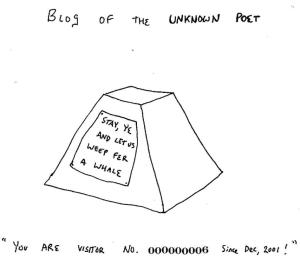
In the House of Poetry
there are many rooms.
Each contains its artefacts,
its precious heirlooms,
and at each door,
there is a man
who knows what lines the walls.
(He also knows the rules.)
With courtesy he beckons one,
"Won't you come inside?
"All those who hang in here,"
he says,
"have poems, circumscribed."
At a table to one side
there is a box of words.
"When you've studied what hangs here,"
he says,
(as if speaking to a child),
"you may choose some words yourself,
wherewith to ape this style."
I started in the Sonnet Room,
as many people do,
and found the poems fine in there,
each neatly framed within
the space of fourteen lines,
with never one to spare.
I further measured them
and found - to my surprise -
that each was also five feet long,
and strode with even stride,
te tum, te tum, te tum,
just like a bloody drum.
Different folk throughout the years
have seemed to like this pace;
Shakespeare's is a hallowed form,
but Petrarch has his place,
and rhymesters through the ages
have found the sonnet good
when applied, with fervency,
to themes of hopeful love.
Just then I heard a stirring,
for it was Potlach soon,
and many hopefuls
rushed headlong
into a nearby room,
whose doorman cried right lustily,
in a voice that boomed out loud,
"Nine liners here of even tread,
with two refrains beside!"
With breath that barely paused,
he called on folks from far.
"Be not bemused," he said,
"for all these poems rhyme,
according to a scheme that goes
abar, then bab,
and then again, abar,
- for a second time."
The cohort clapped, thus giving him
a Roundel of applause.
I was tempted for a time,
but then I saw another door
with a 'Welcome' sign.
An unkempt man its keeper,
beckoned me with glee,
"Come and look inside," he said,
"for entry here is free.
"There are no rules,
"no graticules,
"no grids and no remorse."
The table in his room
invited one (of course),
and there, beside its box of words,
there was another boon,
a conglomerate of magic,
to be used by us eftsoon.
He gave me a most covert, but
rather charming grin.
"I have been here for years," he said,
"waiting for my muse,
"and I have stolen from each room
"a little of their craft,
"from which you're free to choose.
"I cannot for the life of me
"remember which from which
"but if you use their flavours
"as spices, as you wish,
"they will make your poetry
"a tasty little dish,
"not at all like cabbage words
"of limp, pragmatic prose."
I liked the sound of what he said
but a question sprang to mind.
"What is it, really, to be completely free?"
"Cut the cords, unlock the doors,
and take a step outside."
I wandered off but wondered,
"Am I really free?"
I still have rhythms in my heart
and rhymes etched in my mind,
and without this past legacy
would writing not be bland?
When used within the context
of what you want to say,
learnt conventions, I believe,
should be allowed to stand.
A poet's like an architect
who uses pen and mind,
to make new buildings soar.
If he's to build an edifice
that stands the test of time,
its foundations must be strong,
or else it won't endure.
|





